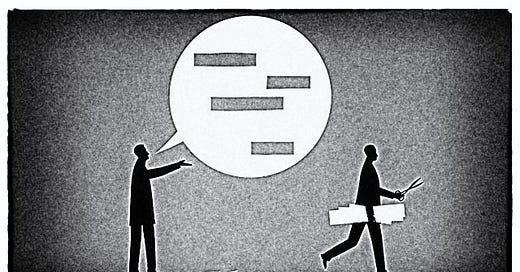TWITTER FILES: Brown University's Claire Wardle Aids Censorship
Researchers on "disinformation" have little in common with academic scholars teaching Proust or studying astrophysics.
9 minute read
The Washington Post defended campus researchers collaborating with federal agencies to censor Americans in an awkward, bumbling article last week, alleging that congressional staff demanding university documents were “harassing academics” who studied falsehoods spread by Trump. In reality, Congress is investigating campus employees who have little in common with traditional university scholars teaching Proust or studying the atmospheric chemistry of distant planets.
Just last year, one Stanford University researcher disclosed that he and other academics at Stanford and the University of Washington worked with an agency in the Department of Homeland Security (DHS) “to fill the gap of the things the government could not do themselves,” admitting that academics served as a cutout for federal censoring of Americans. The DHS agency campus researchers collaborated with is called the Cybersecurity & Infrastructure Security Agency or CISA.
In a recent investigation, Tablet magazine noted that in 2021 CISA began determining which ideas Americans were allowed to discuss and debate during the COVID-19 pandemic.
Documents I discovered at Twitter’s headquarters further tie these censorship efforts to another researcher—Brown University’s Claire Wardle.
Who is Claire Wardle?
Largely unknown to most Americans, Wardle is a central figure in the disinformation industry and helped organize many of today’s campus disinformation groups in 2015 with funding from Google. But searching through Twitter’s files, I uncovered a government document marked “for official use only” that finds Wardle had also been chosen to brief CISA’s advisory committee.
A spokesperson for CISA emailed yesterday that he would get back to me and explain how often Wardle had briefed the agency.
Wardle has no training or background in science, yet she has long sought to define herself as an expert on vaccines. In a 2019 Twitter email that I discovered, Wardle tried to involve the company’s executives in a Ted Talk event that would define “credible sources” and “quality information around vaccines.”
That next year, Wardle emailed Twitter executives a report she had written looking into what she deemed to be antivaccine conspiracies and narratives found on social media. Wardle sent the email days after Pfizer announced initial positive findings for their COVID vaccine—results which Wardle said forced her to hurry up the report’s release.
“The dominant vaccine narrative is designed to undermine confidence in institutions and scientific sources,” Wardle alleged, in her email to Twitter. Wardle claimed in her report that vaccine mandates are “one of the prominent anti-vaccination narratives”—a narrative which, oddly enough, proved to be accurate when US companies as well as state and federal agencies began mandating COVID vaccines.
Since Wardle published her vaccine findings, one of the report’s authors joined a secretive UK government agency that investigative journalists exposed in recent weeks for censoring British citizens. Meanwhile, one of the report’s contributing researchers now works for a global PR firm that an Australian investigation found was helping that country’s government to censor its own people.
Keep reading with a 7-day free trial
Subscribe to The DisInformation Chronicle to keep reading this post and get 7 days of free access to the full post archives.




